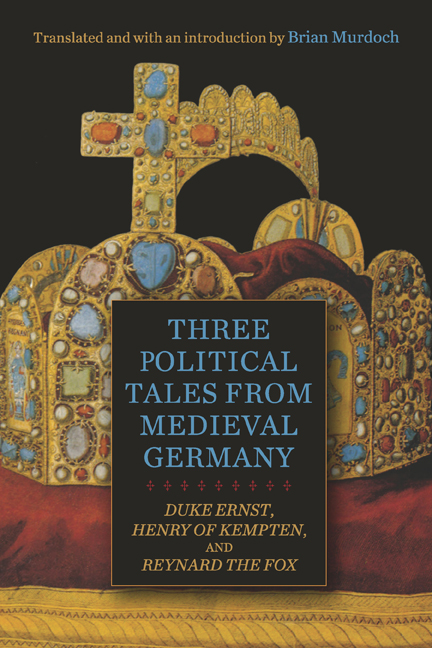 Three Political Tales from Medieval Germany
Three Political Tales from Medieval Germany Published online by Cambridge University Press: 09 May 2024
This collection offers translations of three tales, originally in verse, from medieval Germany. The first—whose author is anonymous—is the story of Duke Ernst (Herzog Ernst); the second, by the well-known and prolific writer Konrad von Würzburg, is that of Henry of Kempten (Heinrich von Kempten; the work is also known as Otto mit dem Bart); and the third, by an author of whom we know very little, but who names himself as Heinrich, is about a figure who is very well known, Reynard the Fox (Reinhart Fuchs). The three tales, two about knights and adventure and one about the trickery of a cunning fox, are all entertaining, but they are also all essentially political, and their messages are not exclusively medieval. The first two, although exciting and adventurous (and Ernst in particular travels and meets exotic and strange creatures), both show young men in conflict with the state, or its embodiment in the emperor, and both men learn the necessity of compromise in order to maintain the stability of the state. The third story first shows us the familiar fox up to his usual pranks but then becomes darker as the fox becomes the most untrustworthy adviser at the court of the lion king in a disturbing fable about the acquisition of power.
For help in the production of this book, several votes of thanks are due, first to the many students with whom I read and discussed these texts over a good number of years at the University of Stirling. In the production of this book, I owe a great debt of gratitude to the two readers, who made informed, detailed, and extremely useful comments; this is an aspect of academic work that deserves much credit and thanks (although in the time-honored but quite genuine formula, any remaining errors are my responsibility!). My professional and my personal thanks go, too, to the indefatigable Jim Walker, whose expertise, advice, and endless patience have meant a great deal to me over the many years we have worked together, when he has supported me in publishing books on both modern and medieval literature.
To save this book to your Kindle, first ensure [email protected] is added to your Approved Personal Document E-mail List under your Personal Document Settings on the Manage Your Content and Devices page of your Amazon account. Then enter the ‘name’ part of your Kindle email address below. Find out more about saving to your Kindle.
Note you can select to save to either the @free.kindle.com or @kindle.com variations. ‘@free.kindle.com’ emails are free but can only be saved to your device when it is connected to wi-fi. ‘@kindle.com’ emails can be delivered even when you are not connected to wi-fi, but note that service fees apply.
Find out more about the Kindle Personal Document Service.
To save content items to your account, please confirm that you agree to abide by our usage policies. If this is the first time you use this feature, you will be asked to authorise Cambridge Core to connect with your account. Find out more about saving content to Dropbox.
To save content items to your account, please confirm that you agree to abide by our usage policies. If this is the first time you use this feature, you will be asked to authorise Cambridge Core to connect with your account. Find out more about saving content to Google Drive.